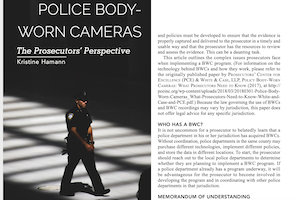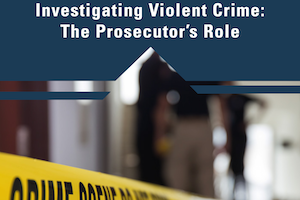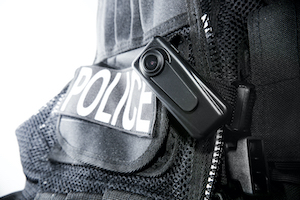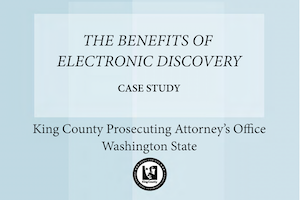Delaware Prosecutor Innovations

Author: PCE


Author: PCE

Author: PCE
On February 13, 2019, the Vera Institute of Justice hosted a webinar to provide an overview of the resources and objectives of the Serving Safely National Initiative to Enhance Policing for Persons with Mental Illnesses and Developmental Disabilities. PCE is a partner on the initiative and works alongside Vera to provide training and technical assistance to prosecutor’s offices on innovative programs addressing people with mental illness and intellectual disabilities. Recipients of the training and technical assistance include the Rockland County DA’s Office (NY), Los Angeles County DA’s Office, and the New York State Attorney General’s Office.

Authors: PCE, NRTAC
As the demand for forensic evidence has exploded, so has the pressure on crime laboratories to keep pace with an ever-growing workload. This paper, developed by PCE’s Executive Director Kristine Hamann and St. Louis Circuit Attorney’s Office Chief of Trials Rachel Smith, addresses the critical question of how best to maximize the resources of a public forensic laboratory. This question is explored in three different parts, each with an emphasis on the prosecutor’s perspective:
Read More
Author(s): Kristine Hamann and Rachel Smith
Technology is expanding, evolving, and improving at an explosive rate. Society, including law enforcement, is struggling to keep pace with these seemingly daily developments. This paper addresses facial recognition technology used by law enforcement to enhance surveillance capabilities and the associated legal issues it raises.
Read More
Author(s): Kristine Hamann
As police departments across the United States embrace the use of police body-worn cameras, the cameras will inevitably capture a great deal of evidentiary material that will be useful in every type of criminal prosecution. The impact of this new source of evidence has yet to be fully realized.

Author(s): Kristine Hamann, PCE and John Delaney
Violent crime prosecutors do difficult and important work. In October 2017, fifteen seasoned violent-crime prosecutors spent a day and a half sharing their ideas about how to improve the investigation of violent crimes at a meeting sponsored by the Bureau of Justice Assistance of the U.S. Department of Justice. Though the group had much in common, it was quickly apparent that there are a variety of approaches to their work.
Read MorePCE and John Delaney, First Assistant District Attorney from the Philadelphia District Attorney’s Office (retired) presented during this webinar.

Author(s): Kristine Hamann, PCE
As police departments across the United States embrace the use of police body-worn cameras (“BWCs”), it is imperative that prosecutors be involved in the uptake process as early as possible. The cameras will inevitably capture a great deal of evidentiary material that will be used in every type of criminal prosecution. Thus, systems and policies must be developed to ensure that this evidence is properly captured and delivered to the prosecutor in a timely and usable way.
Read More
Author(s): Kristine Hamann, PCE
Prosecutors are obligated to provide timely and complete discovery, particularly with regard to exculpatory and impeachment material. The discovery process can be complex and time consuming. Failure to properly record discovery documents provided to the defense can jeopardize cases and put prosecutors at risk of being charged with ethical violations.
Read More